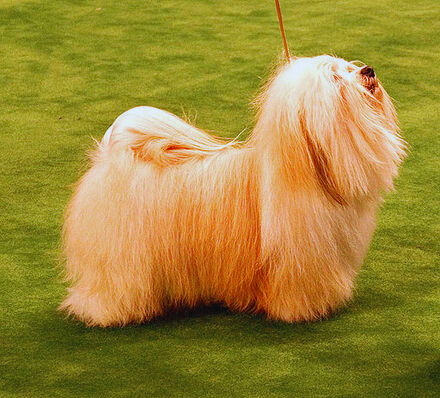The Havanese dog breed, originating from Cuba, is a small, sturdy dog known for its charming personality and luxurious coat. As a member of the Bichon family, the Havanese exude elegance and grace, making them a popular choice for families seeking a loving and adaptable companion.
Origins and History
Cuban aristocrats adored the Havanese breed dating back to the 18th century, and it eventually became the national dog of Cuba. Spanish settlers brought Mediterranean Bichon-type dogs to the island, which can trace its lineage to the Havanese breed. Over time, the breed developed its distinct characteristics, thriving in the warm climate and vibrant culture of Cuba.
Physical Characteristics
Coat and Color
Their soft, silky coat, which can vary in color from white, cream, and champagne to black, silver, and chocolate, has earned the Havanese renown. Their double coat is non-shedding and hypoallergenic, making them an excellent choice for allergy sufferers.
Size and Build
Compact yet sturdy, the Havanese typically weighs between 7 and 13 pounds and stand at a height of 8.5 to 11.5 inches at the shoulder. Despite their small stature, they possess a well-proportioned build with a slightly longer body than height.
Temperament and Behavior
Affectionate Nature
Havanese dogs are renowned for their affectionate and sociable demeanor. They thrive on human companionship and enjoy being an integral part of the family. Their gentle disposition makes them excellent therapy dogs and ideal companions for children and seniors alike.
Intelligence and Trainability
Highly intelligent and eager to please, Havanese dogs excel in obedience training and agility activities. Their quick learning ability and inherent desire to please their owners make them a joy to train, whether for basic commands or advanced tricks.
Health and Care
Lifespan
On average, Havanese dogs have a lifespan of 12 to 15 years, with proper care and regular veterinary check-ups playing a crucial role in maintaining their health and well-being.
Common Health Issues
While generally healthy, Havanese dogs may be prone to certain health conditions, including:
- Luxating patella: a condition where the kneecap dislocates from its normal position.
- Progressive Retinal Atrophy (PRA): is a degenerative eye disorder that can lead to vision loss.
- Canine hip Dysplasia: is a hereditary condition affecting the hip joints.
Grooming Requirements
Regular grooming is essential to keeping the Havanese’s coat healthy and free from mats and tangles. Brushing several times a week, along with occasional baths and trimming, helps maintain their signature silky coat and prevents excessive shedding.
Frequently Asked Questions (FAQs)
1. Are Havanese dogs good with children?
Havanese dogs are known for their gentle and affectionate nature, making them excellent companions for children. They enjoy playing and interacting with kids, and their small size makes them less intimidating for younger family members. However, as with any dog breed, proper socialization and supervision are essential to ensuring harmonious interactions between the dog and children.
2. Do Havanese dogs require a lot of grooming?
Yes, Havanese dogs have a long, silky coat that requires regular grooming to prevent mats and tangles. Brushing several times a week is necessary to keep their coat in optimal condition and minimize shedding. Occasional baths and trimming may also be required to maintain their appearance and hygiene.
3. Are Havanese dogs hypoallergenic?
Yes, Havanese dogs are considered hypoallergenic, meaning they are less likely to trigger allergic reactions in individuals prone to pet allergies. Their non-shedding coat produces less dander, which is a common allergen found in pet hair. However, it’s essential to note that no dog breed is completely hypoallergenic, and individual sensitivities may vary.
4. Do Havanese dogs have any specific exercise requirements?
While Havanese dogs are energetic and enjoy playtime, they do not have extensive exercise requirements compared to some larger breeds. Daily walks and interactive play sessions are usually sufficient to keep them physically and mentally stimulated. However, they thrive on companionship and enjoy engaging in activities with their owners, making them ideal companions for both indoor and outdoor adventures.
Conclusion
In conclusion, the Havanese dog breed offers a delightful combination of charm, intelligence, and affection, making them cherished companions for families around the world. With their playful demeanor and unwavering loyalty, Havanese dogs continue to capture the hearts of dog lovers everywhere.

